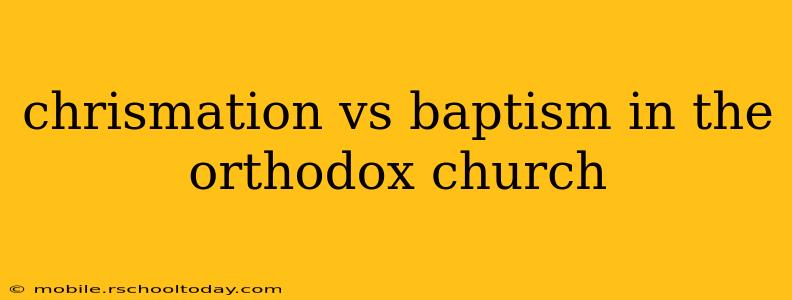The Orthodox Church views Baptism and Chrismation (also called Confirmation in some Western traditions) as two distinct yet inseparable sacraments, often administered consecutively as a single, unified rite. While both are essential for full initiation into the Orthodox Christian faith, understanding their individual roles clarifies their significance. This article delves into the differences and interconnectedness of these sacred mysteries.
What is Baptism in the Orthodox Church?
Baptism is the first and most fundamental sacrament of the Orthodox Church. It's a complete immersion in water, signifying the death to old sin and the resurrection to new life in Christ. This symbolic death and resurrection mirrors Christ's own death and resurrection, cleansing the individual from original sin and all personal sins committed before baptism. It's a profound act of cleansing and rebirth, initiating the individual into the Body of Christ – the Church.
Key aspects of Orthodox Baptism:
- Full Immersion: Unlike some other Christian traditions, Orthodox Baptism involves complete immersion in water, representing a complete washing away of sin.
- Trinitarian Formula: The priest invokes the Holy Trinity (Father, Son, and Holy Spirit) during the immersion, highlighting the divine nature of the sacrament.
- Symbolic Death and Resurrection: The act of immersion symbolizes dying to the old self and rising to new life in Christ.
- Initiation into the Church: Baptism marks the beginning of one's journey as a member of the Orthodox Church.
What is Chrismation in the Orthodox Church?
Chrismation, immediately following baptism, seals the newly baptized individual with the Holy Spirit. The priest anoints the individual with holy oil (Chrism), invoking the Holy Spirit upon them. This anointing imprints the grace of the Holy Spirit, granting the newly baptized person the gifts and charisms of the Spirit and making them a full and active member of the Church.
Key aspects of Orthodox Chrismation:
- Anointing with Chrism: The priest anoints various parts of the body with holy oil, signifying the bestowal of the Holy Spirit.
- Imparting Spiritual Gifts: Chrismation bestows the gifts of the Holy Spirit, empowering the individual for Christian life and service.
- Indelible Seal: The seal of Chrismation is considered indelible, marking the individual as a member of the Church forever.
- Full Participation in the Sacraments: Following Chrismation, the individual is fully able to participate in all other sacraments of the Church.
Are Baptism and Chrismation Separate Sacraments?
While performed consecutively, Baptism and Chrismation are distinct sacraments. Baptism cleanses from sin, while Chrismation confers the gifts of the Holy Spirit. However, they are inseparable in the Orthodox tradition. They are essentially two parts of a single initiation rite, forming a complete and unified act of entrance into the Church. One cannot fully receive the grace of Baptism without the sealing of Chrismation.
Why are Baptism and Chrismation Performed Together?
The close connection stems from the inseparable nature of Christ's work. His death and resurrection (represented by Baptism) are inseparable from the outpouring of the Holy Spirit (represented by Chrismation). This unity reflects the indivisible nature of God's saving action in Christ. The sacraments are performed together to highlight the complete work of salvation in a single act.
Can Someone Be Baptized Without Being Chrismated?
No, according to Orthodox tradition, Baptism without Chrismation is incomplete. Although historical exceptions exist in unique circumstances, the standard practice and teaching insist on both sacraments being performed together for full initiation.
What Happens if Someone is Baptized in Another Christian Denomination?
The Orthodox Church recognizes the validity of Baptism performed in other denominations that use the Trinitarian formula (in the name of the Father, and of the Son, and of the Holy Spirit). However, individuals baptized in other traditions usually undergo Chrismation in the Orthodox Church to be fully initiated into its life and sacramental system. This acknowledges their prior baptism while completing their incorporation into the Orthodox Church.
Understanding the distinct yet interconnected nature of Baptism and Chrismation provides a deeper appreciation for the richness of the Orthodox sacramental life and the fullness of initiation into the Christian faith. Both sacraments are crucial for spiritual growth and active participation in the life of the Orthodox Church.
